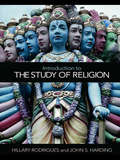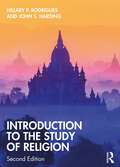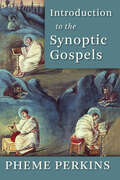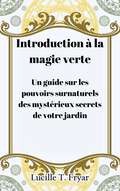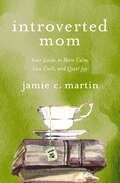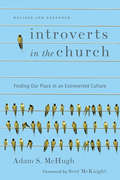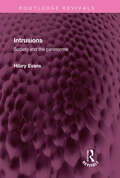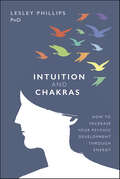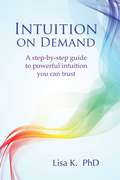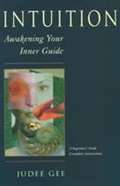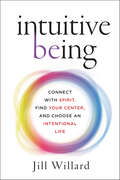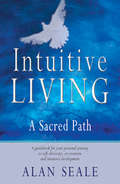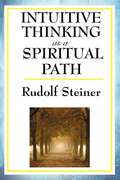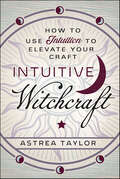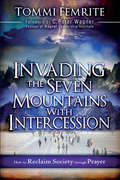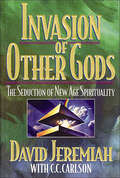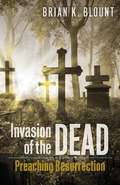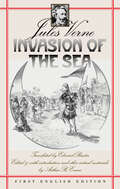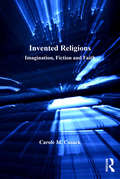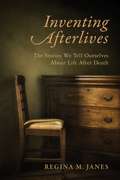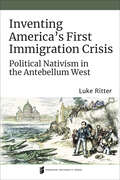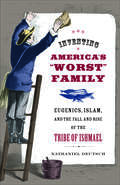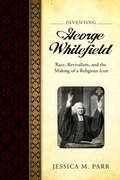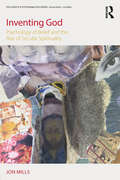- Table View
- List View
Introduction to the Study of Religion
by John S. Harding Hillary P. RodriguesWhy do people study religion? How have they studied it in the past? How do we study religion today? Is the academic study of religion the same as religious education? These and many other questions are addressed in this engaging introduction to the discipline of religious studies, written by two experienced university teachers. The authors have crafted this book to familiarize novice students with key concepts and terminology in the study of religion. More advanced students will find a varied array of theoretical perspectives and methodological approaches to the field. Topics include: definitions of religion perspectives in the study and teaching of religion how religion began to be studied: traditional perspectives – philosophical and theological how people experience religion: perspectives in the study of religious consciousness and perception – phenomenological and psychological studying religion within communities: Social and cultural perspectives – anthropological, sociological, political and economic judging religion: critical perspectives –feminist approaches, the interaction of popular literature and religion contextual perspectives – historical and comparative. The book encourages students to think critically about the theories and methods presented. Students will find arguments for the strengths and limitations of these approaches, understand connections among religious studies and other intellectual movements, and develop their own ideas of how they might want to go about the study of religion. Summary boxes, a timeline, a glossary and other pedagogic aids help students grasp key concepts, along with a companion website at www.sastor.com.
Introduction to the Study of Religion
by John S. Harding Hillary P. RodriguesWhy do people study religion? How have they studied it in the past? How do we study religion today? Is the academic study of religion the same as religious education? These and many other questions are addressed in this engaging introduction to the discipline of religious studies. Topics include Definitions of religion Perspectives in the study and teaching of religion How religion began to be studied: Traditional perspectives—philosophical and theological How people experience religion: Perspectives in the study of religious consciousness and perception—phenomenological and psychological Studying religion within communities: Social and cultural perspectives—anthropological, sociological, political, and economic Judging religion: Critical perspectives—feminist approaches, the interaction of popular literature and religion Contextual perspectives—historical and comparative Themes, theories, and current directions The thoroughly updated second edition encourages students to think critically about the theories and methods presented. Students will find arguments for the strengths and limitations of these approaches, understand connections among religious studies and other intellectual movements, and develop their own ideas of how they might want to go about the study of religion. Summary boxes, discussion questions, a glossary, a chronology of key figures and texts, and other pedagogic aids help students grasp key concepts.
Introduction to the Synoptic Gospels
by Pheme PerkinsIn this book respected New Testament scholar Pheme Perkins delivers a clear, fresh, informed introduction to the earliest written accounts of Jesus — Matthew, Mark, and Luke — situating those canonical Gospels within the wider world of oral storytelling and literary production of the first and second centuries. Cutting through the media confusion over new Gospel finds, Perkins’s Introduction to the Synoptic Gospels presents a balanced, responsible look at how the Gospels of Matthew, Mark, and Luke came to be and what they mean.
Introduction à la magie verte: Un guide sur les pouvoirs surnaturels des mystérieux secrets de votre jardin
by Lucille T. FryarDémystifiez les pouvoirs cachés de la magie ancienne avec ce guide simple sur la magie verte. Toute sorcière peut insuffler dans sa vie de tous les jours la pratique et l'expérience du surnaturel grâce à la magie verte. Ce guide facile à comprendre vous introduit doucement dans le monde de la magie verte qui nous entoure et, en même temps, explique les anciennes pratiques sous des formes faciles à comprendre pour vous aider à saisir et à mettre en pratique les concepts de base de cette forme de magie. En tant que sorcière verte, vous devez être ouverte à la puissance de la nature qui coule à travers vous : tirez et exploitez les pouvoirs des herbes, des fleurs et des pierres pour vos sorts. Dans ce guide, vous apprendrez des méthodes simples pour cultiver vos plantes magiques et les types de plantes qui existent et comment faire ressortir la magie qu'elles renferment afin d'améliorer votre pratique. Grâce aux précieux conseils sur l'utilisation d'ingrédients magiques, vous prendrez plusieurs longueurs d'avance dans la prise en charge de votre pratique et forgerez un lien plus profond avec la nature. Accompagnez Lucille T. Fryar dans cet incroyable voyage et créez quelque chose de magique qui durera toujours ! Les épices et les herbes les plus omniprésentes dans votre jardin ou votre cuisine regorgent de pouvoirs qui dépassent votre imagination la plus folle et qui ne peuvent être libérés que par ceux et celles qui sont dotés des connaissances nécessaires pour y parvenir. À l'ère de la technologie de l'information, il faut s'engager à découvrir l'immense pouvoir que recèle la nature. Si vous souhaitez devenir une initiée, ce guide vous ouvrira le monde de la magie verte intemporelle. Ce livre est unique en son genre : Il fournit une forme d'aide qui n'est pas facilement disponible pour transformer les pouvoirs de la nature venant de l'extérieur dans votre espace person
Introverted Mom: Your Guide to More Calm, Less Guilt, and Quiet Joy
by Jamie C. MartinMotherhood is beautiful; motherhood is hard. All moms understand this paradoxical truth. Yet introverted mothers face unique challenges. When our quiet nature collides with our often loud role, frustration and guilt result. We wonder why motherhood feels at odds with our personality, and in our darkest moments fear we're simply not cut out for the job.In Introverted Mom, author Jamie C. Martin lifts the false burdens and negative stereotypes off your shoulders, letting you know you're not alone. Your steady strength is exactly what your family needs in this chaotic world. And when you understand and accept your God-given personality, you'll discover a freedom you may never have experienced before.Jamie shares vulnerable stories from her own life as well as thoughts from other kindred-spirit moms, helping you add more calm to your days. Her practical suggestions and creative inspiration, combined with quotes and insights from four well-known introverted writers, point you back toward hope, laughter, and quiet joy. Whether you've just realized you’re an introvert, or if you've known it all along, this book is for you. It's time to honor who you are and savor life as an introverted mom.
Introverts in the Church: Finding Our Place in an Extroverted Culture
by Adam S. McHughIntroverts in the Church
Intrusions: Society and the paranormal (Routledge Revivals)
by Hilary EvansFirst published in 1982, Intrusions examines a wide range of cases down through history, showing how ordinary people have regarded the paranormal in contrast with ‘official’ attitudes, and how society as a whole has attempted to deal with happenings that are inexplicable in terms of current scientific or religious theory. He discusses questions such as What did Shakespeare’s audience feel about Hamlet’s father’s ghost? Why did a renewed interest in magic follow ‘the age of enlightenment?’ How did Victorian science respond to spiritualism, and why has scientific psychical research, when it finally came, encountered continued opposition? Drawing on reports and accounts of very kind, Mr. Evans gives an authentic account of prevailing attitudes, focussing for the first time directly on the experiences and points of view of ordinary people. He demonstrates that society has been, and still is, badly served by the intellectual establishment in matters relating to the paranormal. Although there are signs that the situation is improving, there is still a dismaying degree of reluctance even to investigate, let alone accept, these phenomena, yet they continue to occur, and people continue to seek explanations for them. This book will be of interest to anyone interested in the mysteries of the paranormal as well as to students of parapsychology, history and literature.
Intuition and Chakras: How to Increase Your Psychic Development Through Energy
by Lesley PhillipsBuild a Reliable System of Inner Wisdom Using Your Energy BodyThis remarkable book makes it easy to receive intuitive guidance whenever you wish, be confident in your answers to life's big questions, and follow your inner wisdom to happiness and success. Lesley Phillips shows you how to develop your unique profile of psychic abilities through simple energetic techniques. By uniting your subtle body and intuition, you can heighten self-knowledge, reveal your inner truth, heal on multiple levels, and create your best reality.Intuition and Chakras gives you the foundation needed to safely and effectively develop both your chakras and your intuitive senses. Discover many inspiring stories from Lesley's work with clients. Explore each chakra and how intuitive information flows through it. Featuring accessible exercises and meditations, this book helps you overcome challenges, turn your intuition into a practical tool, and lead a purpose-filled life.As an added bonus, you'll get an exclusive link to meditation videos directly related to the book's core topics!
Intuition on Demand: A step-by-step guide to powerful intuition you can trust
by Lisa K.• Has your intuition been giving you messages but you don’t know what they mean? • Do you find it hard to trust your intuition because you think you might be making it up? • Would you like to have intuitive guidance at your fingertips, but you’re not sure if your intuition is working at all? • Do you want to have more understandable information from your intuition? "Intuition On Demand" can help you fix all these problems once and for all. If you’re in control of your intuition, you can find the right answers to questions such as: Should I move? Where should I go? Who do I pick to be my friend, spouse, doctor or lawyer? How do I fix the difficulties in my relationship? What should I do to improve my health? Why am I stuck in my career? When you finish reading this book you’ll be able to make your intuition happen when you want, on what you want and get detailed information. You’ll have an education and understanding of intuition so you can get instant intuitive guidance for all your important life decisions and know what action to take that will give you a better outcome. You’ll always be assured of the best course of action to take to feel safe, comforted and calm. Lisa K. PhD developed these methods and technique to help her become a sold out intuitive reader and one day save her life. Developed from years of research, training and experience, "Intuition On Demand" provides a step-by-step technique to help others, like yourself, to develop your intuition from scratch - discover the intuition development map, Lisa’s signature "Intuition On Demand" technique, ways to reprogram your thinking, intuition worksheets, practical exercises and much more.
Intuition: Awakening Your Inner Guide
by Judee GeeIntuition is guidance from your inner being. It is a manifestation of divine consciousness. Innate to each of us, intuition is an often ignored gift because we are taught to have more respect for thoughts presented to us from the outside world than for the voice within ourselves. Judee Gee helps you to awaken, channel, and express your intuitive self. Through guided meditations, simple rituals, awareness exercises, and the principles of inner alchemy, you can rediscover and realign with your inner voice. Turn the mystery of intuition into a tangible catalyst for personal transformation! Essential to emotional and physical health, to creative self-expression, and to understanding others, it can help you recognize and realize your spiritual potential. Learn how to use intuition as a guide through doubts, fears, and adversities. Perceptive and practical, this book delivers a heart-felt invitation to the liberation of your intuitive inner being.
Intuitive Being: Connect with Spirit, Find Your Center, and Choose an Intentional Life
by Jill Willard“Intuitive Being shows us how to unlock the power of our intuition to make better decisions and live a more satisfying life.” —Deepak Chopra, New York Times–bestselling authorOne of GOOP’s Fall ’16 Nonfiction Top PicksBeloved by celebrities and CEOs alike, intuitive medium Jill Willard’s revolutionary approach to honing and tapping into the profound potential of your intuition teaches readers:How our inner voice is fundamentally connected to spiritHow to unleash the power and wisdom of intuition through unblocking and balancing each of the seven energy centers within ourselves—the gateways that connect our inner being to spiritHow that connection is at the heart of intuitionHow to use that connection for better decision-making and informed choices that lead to unlimited growth and ultimate abundance in every area of our lives“Jill Willard . . . guided us through tapping into and translating gut instinct greater knowing.” —GOOP[Willard’s] confidence in her ability to access her own ‘voice of knowing’ enables her to cast a clear light on that function and talk about it in logical, understandable terms. She doesn’t cloak it in the sensationalized overtones that often accompany such discussions. Rather she speaks inclusively and with compassion.” —Anna Jedrziewski, Retailing Insight Magazine
Intuitive Living: A Sacred Path
by Alan SealeThis modern guidebook to spiritual growth starts with the awakening of self-awareness; awareness of our bodies, our feelings, our thoughts and the energy that flows through every cell of our being. It leads us to the inner states of freedom and peace,seen not as the absence of conflict, but rather a response based on a deeply rooted knowledge that no matter what is happening around you, nothing can harm you at your center. Seale works with the tool of meditation and shows how we can open to the language of love and Spirit. Includes 45 exercises and meditations which speak to us in profoundly different ways at each stage of spiritual growth and can therefore be of great value both now and as our practice deepens. Glossary. Bibliography. Index.
Intuitive Thinking as a Spiritual Path
by Rudolf SteinerIntuitive Thinking as a Spiritual Path is Rudolf Steiner's most important work. In it he explains the two aspects of free will: freedom of thought and freedom of action. This landmark book explores free will from a completely fresh and unique perspective. If an idea is to become action, man must first want it before it can happen. Such an act of will therefore has its grounds only in man himself. Man is then the ultimate determinant of his action. He is free. -Rudolf Steiner
Intuitive Witchcraft: How to Use Intuition to Elevate Your Craft
by Astrea Taylor“An absolutely terrific book, full of heart, practical advice, and some of the best witchcraft to make the printed page in years.” ―Jason Mankey, author of The Horned God of the WitchesFeaturing extensive exercises, examples, and rituals, this amazing book reveals how to embrace the wisdom of your inner voice as you explore the endless possibilities of witchcraft. With Astrea Taylor’s guidance, you can unlock your intuitive magical potential and celebrate the truth of who you are.Intuitive Witchcraft also offers insights from some of the best writers, thinkers, and leaders in their fields, helping you become your most empowered self. Discover how to work with energy, interact with deities and spirits, and create a personal practice that fits your beliefs and lifestyles. Learn to face your shadow side, make the mundane magical, use divination tools, and much more. Whether you’re a beginner or advanced practitioner, this incredible book illuminates the path to manifesting your greatest desires in an intuitive way.“Provides techniques for melding intuition and witchcraft in a way that is emotionally and spiritually satisfying.” ―Publishers Weekly“The exercises are a great way to enhance your intuitive connection to nature, deity, and magical practice . . . This book has something useful for practitioners at every level.” ―Alfred Willowhawk, author of I Am Healer, Storyteller and WarriorPriest and host of the podcast Up Close & Personal“From personal shadow work to rituals, to forming your own practicing groups, Astrea brings intuition to the forefront of Witchcraft.” ―Phoenix LeFae, author of Life Ritualized
Invading the Seven Mountains With Intercession: How to Reclaim Society Through Prayer
by Tommi FemriteIf we as Christians accept the evil of this world as both inevitable and beyond our control, we lose our desire to fight it. That is exactly where the devil wants us: apathetic, ineffective and conquered.Author and veteran prayer leader Tommi Femrite offers winning strategies to help prayer warriors defeat Satan&’s forces and reclaim each of the Seven Mountains of society: Family, Religion, Government, Business, Education, Arts and Entertainment, and Media. Her powerful insight will help intercessors appreciate their value and understand their mission, while her targeted prayers will empower them to stand in the gap for those ascending each mountain. Invading the Seven Mountains With Intercession will inspire you to reclaim your world for the kingdom of God.
Invasion of Other Gods: The Seduction of New Age Spirituality
by Dr. David Jeremiah C. C. CarlsonA critical look at New Age spirituality by a Christian pastor inducted into the National Religious Broadcasters Hall of Fame.New Age philosophy is really ancient paganism repackaged for modern consumption. In Invasion of Other Gods, Illumination Book Award winner David Jeremiah shows how this form of spirituality has flooded our culture with teachings and terminology that clearly contradict the Christian Gospel.He discusses the history and thinking behind such neo-pagan practices as crystals and past-life therapy, and shows how innocent seekers, especially those coping with difficult life situations, can fall prey to these phenomena, in an informative guide that will fortify your faith against these seductive temptations.
Invasion of the Dead
by Brian K. BlountOur world and our churches are neither sinful nor lost, they are dead. This dead world is the one that God engages and into which Jesus invaded with a radically different vision of life. In this groundbreaking work, based on his 211 Yale Beecher lectures, Brian K. Blount helps preachers effectively proclaim resurrection in a world consumed by death. Recognizing that both popular culture and popular Christianity are mesmerized by death and dying, Blount offers an alternative apocalyptic vision for our time--one that starts with a clear vision of life that obliterates death and reveals life's essence. Blount explores the portrait and meaning of resurrection through the New Testament (the Book of Revelation, the letters of Paul, and the Gospel of Mark) and explores how to biblically and theologically reconfigure apocalyptic preaching for today. With three illustrative sermons, this book is an ideal resource to help preachers proclaim the power of resurrection.
Invasion of the Sea (Early Classics of Science Fiction)
by Jules VerneFirst English edition of a classic Verne novel. Jules Verne, celebrated French author of Twenty Thousand Leagues Under the Sea and Around the World in 80 Days, wrote over 60 novels collected in the popular series "Voyages Extraordinaires." A handful of these have never been translated into English, including Invasion of the Sea, written in 1904 when large-scale canal digging was very much a part of the political, economic, and military strategy of the world's imperial powers. Instead of linking two seas, as existing canals (the Suez and the Panama) did, Verne proposed a canal that would create a sea in the heart of the Sahara Desert. The story raises a host of concerns — environmental, cultural, and political. The proposed sea threatens the nomadic way of life of those Islamic tribes living on the site, and they declare war. The ensuing struggle is finally resolved only by a cataclysmic natural event. This Wesleyan edition features notes, appendices and an introduction by Verne scholar Arthur B. Evans, as well as reproductions of the illustrations from the original French edition.
Invasion on Mirror Mountain (A\mirror Mountain Adventure Ser. #4)
by Wynnette FraserWhen a construction project brings an army of strangers onto his mountain, twelve-year-old Johnny wonders if one of them may be responsible for the flurry of thefts in the area. It's not your mountain, Johnny Elbert." Johnny Elbert Finlay has seen more strangers and more change come to Mirror Mountain in the last couple of months than he has in his whole life, and he's not so sure he likes it. He feels God trying to remind him that he doesn't own the mountain, but how can he not care when so much is happening? Trees are getting torn down, buildings are going up, a new family has moved in, and worst of all, there has been a series of robberies throughout the entire county. Johnny and his friends Scott and Willis decide they better find out who is behind the robberies, but Johnny ends up discovering more than he bargained for. WYNNETTE FRASER lives in Darlington, South Carolina, and writes from her knowledge of the local rural people. She is also the author of Mystery on Mirror Mountain, Courage on Mirror Mountain, and Mystery at Deepwood Bay. The complete four book series is in the Bookshare library.
Invented Religions: Imagination, Fiction and Faith (Routledge New Religions)
by Carole M. CusackUtilizing contemporary scholarship on secularization, individualism, and consumer capitalism, this book explores religious movements founded in the West which are intentionally fictional: Discordianism, the Church of All Worlds, the Church of the SubGenius, and Jediism. Their continued appeal and success, principally in America but gaining wider audience through the 1980s and 1990s, is chiefly as a result of underground publishing and the internet. This book deals with immensely popular subject matter: Jediism developed from George Lucas' Star Wars films; the Church of the Flying Spaghetti Monster, founded by 26-year-old student Bobby Henderson in 2005 as a protest against the teaching of Intelligent Design in schools; Discordianism and the Church of the SubGenius which retain strong followings and participation rates among college students. The Church of All Worlds' focus on Gaia theology and environmental issues makes it a popular focus of attention. The continued success of these groups of Invented Religions provide a unique opportunity to explore the nature of late/post-modern religious forms, including the use of fiction as part of a bricolage for spirituality, identity-formation, and personal orientation.
Inventing Afterlives: The Stories We Tell Ourselves About Life After Death
by Regina M. JanesWhy is belief in an afterlife so persistent across times and cultures? And how can it coexist with disbelief in an afterlife? Most modern thinkers hold that afterlife belief serves such important psychological and social purposes as consoling survivors, enforcing morality, dispensing justice, or giving life meaning. Yet the earliest, and some more recent, afterlives strikingly fail to satisfy those needs.In Inventing Afterlives, Regina M. Janes proposes a new theory of the origins of the hereafter rooted in the question that a dead body raises: where has the life gone? Humans then and now, in communities and as individuals, ponder what they would want or experience were they in that body. From this endlessly recurring situation, afterlife narratives develop in all their complexity, variety, and ingenuity. Exploring afterlives from Egypt to Sumer, among Jews, Greeks, and Romans, to Christianity’s advent and Islam’s rise, Janes reveals how little concern ancient afterlives had with morality. In south and east Asia, karmic rebirth makes morality self-enforcing and raises a new problem: how to stop re-dying. The British enlightenment, Janes argues, invented the now widespread wish-fulfilling afterlife and illustrates how afterlives change. She also considers the surprising afterlife of afterlives among modern artists and writers who no longer believe in worlds beyond this one. Drawing on a variety of religious traditions; contemporary literature and film; primatology; cognitive science; and evolutionary psychology, Janes shows that in asking what happens after we die, we define the worlds we inhabit and the values by which we live.
Inventing America's First Immigration Crisis: Political Nativism in the Antebellum West (Catholic Practice in North America)
by Luke RitterWhy have Americans expressed concern about immigration at some times but not at others? In pursuit of an answer, this book examines America’s first nativist movement, which responded to the rapid influx of 4.2 million immigrants between 1840 and 1860 and culminated in the dramatic rise of the National American Party. As previous studies have focused on the coasts, historians have not yet completely explained why westerners joined the ranks of the National American, or “Know Nothing,” Party or why the nation’s bloodiest anti-immigrant riots erupted in western cities—namely Chicago, Cincinnati, Louisville, and St. Louis. In focusing on the antebellum West, Inventing America’s First Immigration Crisis illuminates the cultural, economic, and political issues that originally motivated American nativism and explains how it ultimately shaped the political relationship between church and state.In six detailed chapters, Ritter explains how unprecedented immigration from Europe and rapid westward expansion reignited fears of Catholicism as a corrosive force. He presents new research on the inner sanctums of the secretive Order of Know-Nothings and provides original data on immigration, crime, and poverty in the urban West. Ritter argues that the country’s first bout of political nativism actually renewed Americans’ commitment to church-state separation. Native-born Americans compelled Catholics and immigrants, who might have otherwise shared an affinity for monarchism, to accept American-style democracy. Catholics and immigrants forced Americans to adopt a more inclusive definition of religious freedom. This study offers valuable insight into the history of nativism in U.S. politics and sheds light on present-day concerns about immigration, particularly the role of anti-Islamic appeals in recent elections.
Inventing America's Worst Family: Eugenics, Islam, and the Fall and Rise of the Tribe of Ishmael
by Nathaniel DeutschThis book tells the stranger-than-fiction story of how a poor white family from Indiana was scapegoated into prominence as America's "worst" family by the eugenics movement in the early twentieth century, then "reinvented" in the 1970s as part of a vanguard of social rebellion. In what becomes a profoundly unsettling counter-history of the United States, Nathaniel Deutsch traces how the Ishmaels, whose patriarch fought in the Revolutionary War, were discovered in the slums of Indianapolis in the 1870s and became a symbol for all that was wrong with the urban poor. The Ishmaels, actually white Christians, were later celebrated in the 1970s as the founders of the country's first African American Muslim community. This bizarre and fascinating saga reveals how class, race, religion, and science have shaped the nation's history and myths.
Inventing George Whitefield: Race, Revivalism, and the Making of a Religious Icon
by Jessica M. ParrEvangelicals and scholars of religious history have long recognized George Whitefield (1714-1770) as a founding father of American evangelicalism. But Jessica M. Parr argues he was much more than that. He was an enormously influential figure in Anglo-American religious culture, and his expansive missionary career can be understood in multiple ways. Whitefield began as an Anglican clergyman. Many in the Church of England perceived him as a radical. In the American South, Whitefield struggled to reconcile his disdain for the planter class with his belief that slavery was an economic necessity. Whitefield was drawn to an idealized Puritan past that was all but gone by the time of his first visit to New England in 1740.Parr draws from Whitefield's writing and sermons and from newspapers, pamphlets, and other sources to understand Whitefield's career and times. She offers new insights into revivalism, print culture, transatlantic cultural influences, and the relationship between religious thought and slavery. Whitefield became a religious icon shaped in the complexities of revivalism, the contest over religious toleration, and the conflicting role of Christianity for enslaved people. Proslavery Christians used Christianity as a form of social control for slaves, whereas evangelical Christianity's emphasis on "freedom in the eyes of God" suggested a path to political freedom. Parr reveals how Whitefield's death marked the start of a complex legacy that in many ways rendered him more powerful and influential after his death than during his long career.
Inventing God: Psychology of Belief and the Rise of Secular Spirituality (Philosophy and Psychoanalysis)
by Jon MillsIn this controversial book, philosopher and psychoanalyst Jon Mills argues that God does not exist; and more provocatively, that God cannot exist as anything but an idea. Put concisely, God is a psychological creation signifying ultimate ideality. Mills argues that the idea or conception of God is the manifestation of humanity’s denial and response to natural deprivation; a self-relation to an internalized idealized object, the idealization of imagined value. After demonstrating the lack of any empirical evidence and the logical impossibility of God, Mills explains the psychological motivations underlying humanity’s need to invent a supreme being. In a highly nuanced analysis of unconscious processes informing the psychology of belief and institutionalized social ideology, he concludes that belief in God is the failure to accept our impending death and mourn natural absence for the delusion of divine presence. As an alternative to theistic faith, he offers a secular spirituality that emphasizes the quality of lived experience, the primacy of feeling and value inquiry, ethical self-consciousness, aesthetic and ecological sensibility, and authentic relationality toward self, other, and world as the pursuit of a beautiful soul in search of the numinous. Inventing God will be of interest to academics, scholars, lay audiences and students of religious studies, the humanities, philosophy, and psychoanalysis, among other disciplines. It will also appeal to psychotherapists, psychoanalysts and mental health professionals focusing on the integration of humanities and psychoanalysis.
